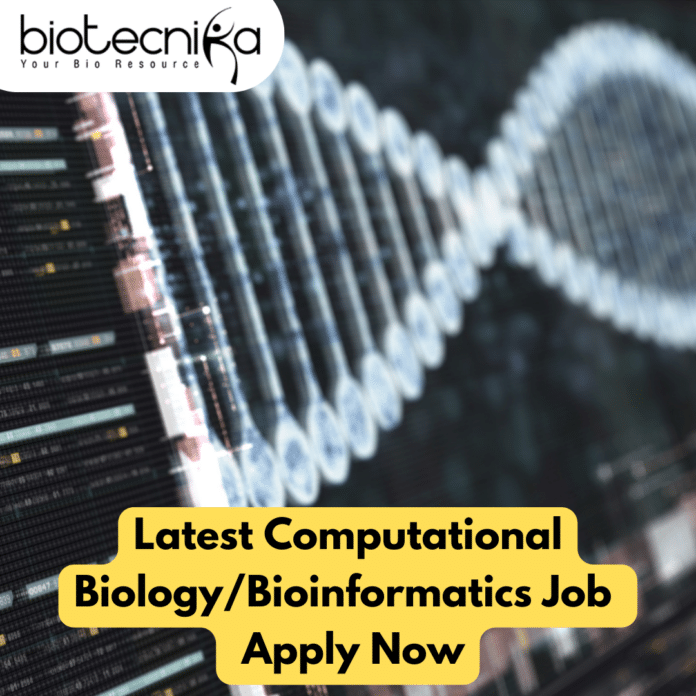Latest Computational Biology/Bioinformatics Job – Check out the details below and Apply Now
Role : Senior Scientist II, Computational Biology / Bioinformatician – Neuroscience Discovery
Employer : AbbVie
Location : Lake County, Illinois
Discipline : Information Technology, Bioinformatics, Science/R&D, Biology, Biotechnology
Required Education : Doctorate/PHD/MD
Position Type : Full time
Job Details :
- At AbbVie the Genomics Research Center (GRC) is a center of excellence for genetics and genomics that supports both Discovery and Development. Within the GRC, the Department of Bioinformatics/Computational Biology is responsible for data analysis and provides analytical insights for both internal and external data. AbbVie’s Neuroscience Discovery advances research to identify novel therapeutic approaches for neurodegenerative disorders like Alzheimer’s and Parkinson’s Disease.
- This position is ideally based in Lake County (North Chicago (IL)) but remote work arrangements will be considered for experienced candidates.
Key Responsibilities:
- Develop and drive computational strategies for biomarker discovery and Precision medicine for early and late-stage projects with a focus on Alzheimer’s Disease, Parkinson’s Disease, migraine, and psychiatric diseases.
- Analyze and integrate genomics, transcriptomics, proteomics, and other OMICS data from consortia, collaborations, preclinical models, and clinical studies to enhance the understanding of disease mechanisms, target/biomarker identification/validation and patient stratification.
- Evaluate, develop, and implement computational methods, pipelines and tools for data analysis and visualization. Interpret results and contribute to hypothesis generation.
- Collaborate with disease biology experts, statisticians and bioinformaticians within AbbVie. Objectives, strategies, results, and interpretation are discussed in interdisciplinary and international teams.
Qualifications:
- Doctoral degree or PhD in Bioinformatics, (Bio)statistics, (Bio)Mathematics or related disciplines with a strong focus on data analysis.
- Preferred 8 years’ experience in hands-on analysis of OMICS data, optimally including genomics data analysis and at least two other OMICS technologies.
- Preferred 4 years’ experience post PhD in disease research optimally in the pharmaceutical industry.
- Fluency in one or more relevant programming languages, such as R or Python.
- Very good communication skills demonstrated in inter-disciplinary teams.
- Experience in basic Neuroscience research and/or Neuroscience drug discovery is a plus.
- Experience with data analysis of clinical studies is a plus.
- Options for remote work will be considered.
Applicable only to applicants applying to a position in any location with pay disclosure requirements under state or local law:
- The compensation range described below is the range of possible base pay compensation that the Company believes in good faith it will pay for this role at the time of this posting based on the job grade for this position. Individual compensation paid within this range will depend on many factors including geographic location, and we may ultimately pay more or less than the posted range. This range may be modified in the future.
- We offer a comprehensive package of benefits including paid time off (vacation, holidays, sick), medical/dental/vision insurance and 401(k) to eligible employees.
- This job is eligible to participate in our short-term incentive programs.
- This job is eligible to participate in our long-term incentive programs.
Note:
- No amount of pay is considered to be wages or compensation until such amount is earned, vested, and determinable.
- The amount and availability of any bonus, commission, incentive, benefits, or any other form of compensation and benefits that are allocable to a particular employee remains in the Company’s sole and absolute discretion unless and until paid and may be modified at the Company’s sole and absolute discretion, consistent with applicable law.
Discover the Latest Computational Biology/Bioinformatics Jobs at Biotecnika Global
Here are some interview questions and possible answers for the role of Senior Scientist II in Computational Biology/Bioinformatics at AbbVie:
- Can you provide an overview of your educational background and how it has prepared you for a role in computational biology and bioinformatics?Answer: I hold a Doctoral degree in Bioinformatics, which has provided me with a strong foundation in data analysis and computational techniques. My academic training focused on the application of statistical and mathematical methods to biological data, making me well-equipped for this role.
- Could you describe your experience with biomarker discovery and precision medicine in the context of neurodegenerative disorders like Alzheimer’s and Parkinson’s Disease?Answer: In my previous roles, I have been actively involved in developing computational strategies for biomarker discovery and precision medicine, particularly in the field of neurodegenerative disorders. I have analyzed diverse data types, including genomics, transcriptomics, and proteomics, to identify potential biomarkers and therapeutic targets for diseases like Alzheimer’s and Parkinson’s Disease.
- How do you stay updated with the latest advancements in computational biology and bioinformatics, and how do you apply this knowledge to your work?Answer: I am committed to continuous learning and staying current with the latest advancements in computational biology and bioinformatics. I regularly attend conferences, read scientific literature, and participate in online courses. I apply this knowledge by incorporating cutting-edge methodologies and tools into my data analysis processes to ensure the highest quality insights.
- Can you discuss a specific project where you developed and implemented computational methods or pipelines for data analysis and visualization? What were the results?Answer: Certainly. In a recent project, I developed a novel computational pipeline to integrate genomics and transcriptomics data from a large-scale clinical study. This allowed us to identify key gene expression patterns associated with disease progression. The results contributed to the validation of a potential biomarker and advanced our understanding of the disease mechanisms.
- Collaboration is crucial in interdisciplinary teams. How have you effectively collaborated with disease biology experts, statisticians, and bioinformaticians to achieve project objectives?Answer: Effective collaboration is a cornerstone of my work. I ensure open communication and foster teamwork by regularly engaging with colleagues from diverse backgrounds. We discuss objectives, strategies, and results in interdisciplinary teams, and I believe that diverse perspectives enhance the quality of our research and analysis.
Check out Biotecnika Global for the Latest Computational Biology/Bioinformatics job opportunities
ALL THE BEST !






